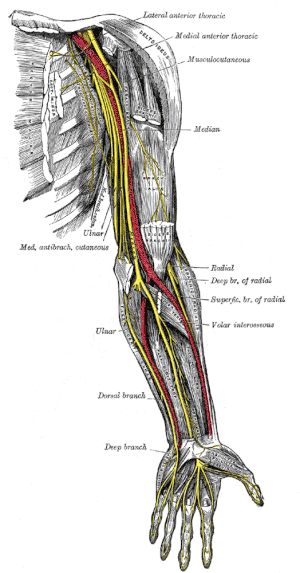Palmar branch of the median nerve
The palmar branch of the median nerve is a branch of the median nerve which arises at the distal part of the forearm.
| Palmar branch of the median nerve | |
|---|---|
 Nerves of the left upper extremity. | |
 Superficial palmar nerves. | |
| Details | |
| From | median nerve |
| Identifiers | |
| Latin | ramus palmaris nervi mediani |
| TA98 | A14.2.03.036 |
| TA2 | 6462 |
| FMA | 44836 |
| Anatomical terms of neuroanatomy | |
Branches
It pierces the palmar carpal ligament, and divides into a lateral and a medial branch;
- The lateral branch supplies the skin over the ball of the thumb, and communicates with the volar branch of the lateral antebrachial cutaneous nerve.
- The medial branch supplies the skin of the palm and communicates with the palmar cutaneous branch of the ulnar.
Clinical significance
Unlike most of the median nerve innervation of the hand, the palmar branch travels superficial to the Flexor retinaculum of the hand. Therefore, this portion of the median nerve usually remains functioning during carpal tunnel syndrome.[1]
Additional images
 Diagram of segmental distribution of the cutaneous nerves of the right upper extremity.
Diagram of segmental distribution of the cutaneous nerves of the right upper extremity.
References
![]() This article incorporates text in the public domain from page 938 of the 20th edition of Gray's Anatomy (1918)
This article incorporates text in the public domain from page 938 of the 20th edition of Gray's Anatomy (1918)
- Ellis, Harold; Susan Standring; Gray, Henry David (2005). Gray's anatomy: the anatomical basis of clinical practice. St. Louis, Mo: Elsevier Churchill Livingstone. p. 700. ISBN 0-443-07168-3.
This article is issued from Wikipedia. The text is licensed under Creative Commons - Attribution - Sharealike. Additional terms may apply for the media files.